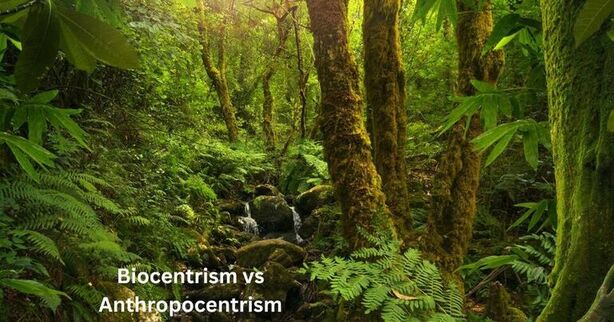The primary distinction between anthropocentrism, biocentrism, and ecocentrism is that the former views humans as the most significant aspect of the universe and the earth, whereas the latter views all living things as having intrinsic value and takes into account the ecosystems’ worth, which includes both living and non-living elements.
A perspective known as centrism centers things on a certain value or group. Three centrism ethics are anthropocentrism, biocentrism, and ecocentrism. Humans are viewed as the primary or most important entities in the world according to anthropocentrism. All other creatures are considered instruments to achieve human aims, according to anthropocentrism.
Biocentrism and ecocentrism, on the other hand, are non- or anti-anthropocentric viewpoints. Humans are viewed as “just another species” without being given a higher inherent value by either ecocentrism or biocentrism. While ecocentrism concentrates on ecosystems, including both living and non-living components, biocentrism concentrates on all living things.
What is Anthropocentrism?
Humans are referred to as “Anthropos” in Greek. Anthropocentrism, commonly referred to as homocentric, is the viewpoint that holds that humans are the most significant organism in the cosmos or on Earth. As a result, anthropocentrism believes that humans are intrinsically more valuable than other creatures.
According to this concept, all other living creatures exist to support human existence. In anthropocentrism, all other creatures serve as methods to further human goals. An important idea in environmental philosophy is anthropocentrism.
What is Biocentrism?
An anti-anthropocentric viewpoint in environmental philosophy is known as biocentrism. It is a belief that encompasses all living things, assigning them inherent worth. Unlike anthropocentrism, it rejects human superiority. Explore more about “Biocentrism Debunked” in this article.
While biocentrism and ecocentrism both emphasize nature, the former does not take into account the latter’s abiotic environmental influences.
What is the Difference Between Anthropocentrism and Biocentrism?
Anthropocentrism is the viewpoint that holds that humans are the most significant beings in the universe or on Earth, while biocentrism holds that all living things have intrinsic worth, and ecocentrism holds that ecosystems, which include both living and non-living elements, have intrinsic worth. The main distinction between anthropocentrism, biocentrism, and ecocentrism is thus this.
Humans are also seen as having a higher inherent value than other creatures in anthropocentrism. In contrast, humans do not have a higher inherent value than other species according to biocentrism and ecocentrism. In a nutshell, anthropocentrism is the notion that the world revolves around humans, whereas biocentrism centers on all living things, and ecocentrism revolves around the natural world or ecosystem.
Conclusion
Three crucial concepts in environmental philosophy are anthropocentrism, biocentrism, and ecocentrism. Anthropocentrism is a system that is centered on humans, whereas biocentrism is a system that is centered on all living things, and ecocentrism is a system that is centered on the ecosystem or nature. The main distinction between anthropocentrism, biocentrism, and ecocentrism is this. Biocentrism and ecocentrism, in contrast to anthropocentrism, view humans as just another species with no greater inherent value.

